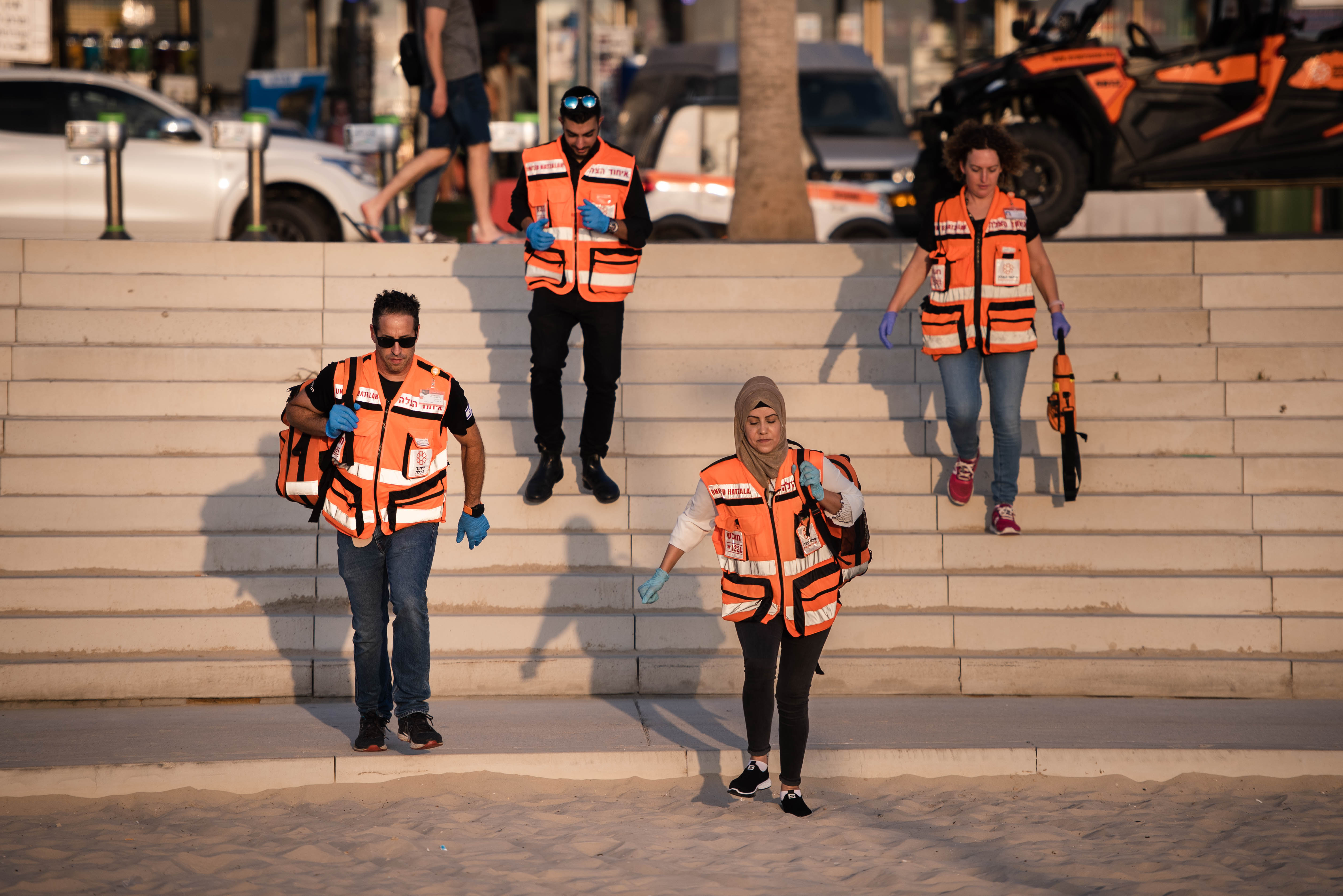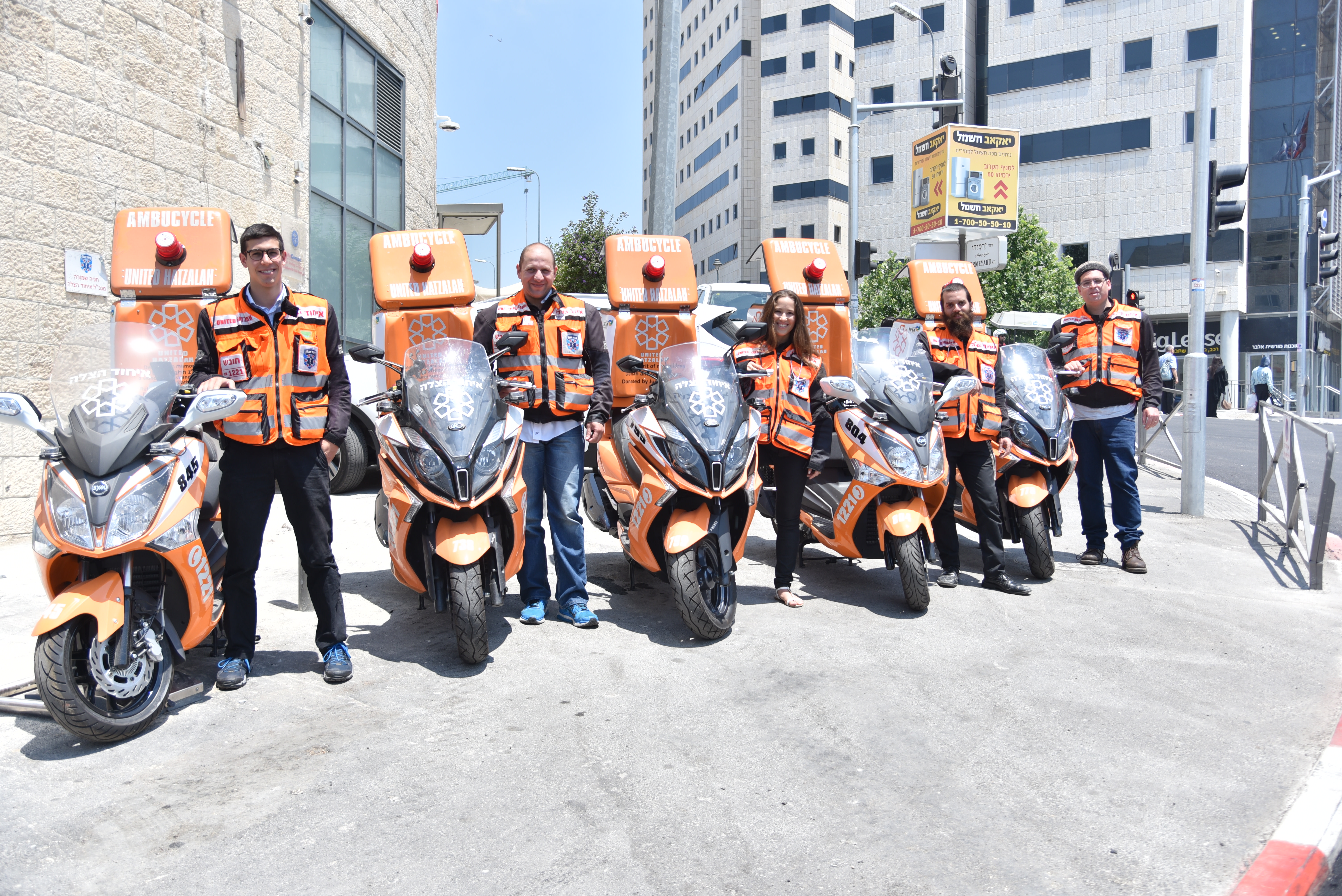Israel was established through a colorful mosaic of people from all different backgrounds, with a common vision for a homeland for the Jewish people. Despite having different languages, traditions and beliefs, these Zionists shared a desire for the betterment of the Jewish people. On Israel’s Diamond Jubilee, United Hatzalah, Israel’s volunteer emergency medical service organization, is a shining example of the basic and fundamental principles stated in Israel’s Declaration of Independence, to be a country founded for the “benefit of all its inhabitants, based on freedom, justice and peace as envisaged by the prophets of Israel.”
Like much of Israel’s history, United Hatzalah emerged as a response to critical events. Naftali Rotenberg, Regional Head United Hatzalah’s Carmel Region from the Ultra-Orthodox community in Kiryat Ata, had been an EMT in the local volunteer rescue unit since 2000. Six years later, at the height of the Second Lebanese War, Rotenberg shares the struggles his local unit faced amidst a national crisis.
“There were many different rescue organizations in Israel at the time and in the north, we were suffering from rocket fire. The volunteer units in Jerusalem wanted to help provide a response while we were in the middle of the war,” Rotenberg says, explaining that rescue units throughout the country were not mobilized to provide unified support for the local teams who were overwhelmed and undermanned in providing emergency support for the local communities. “It was Eli Beer, President of United Hatzalah, and Eli Pollack, CEO, that motivated all the [volunteer] rescue organization in Israel to come together. This is one of the reasons that we call ourselves United Hatzalah, the unification of the rescue units throughout Israel.” 17 years later, United Hatzalah has become the largest fully volunteer emergency response organization in the world.
Although initially established as a volunteer network within Israel’s orthodox communities, United Hatzalah has become an example of building bridges throughout Israel’s diverse population, with over 6,500 volunteers across all religious, ethnic, and ideological backgrounds. United Hatzalah’s national network of volunteer medics are able provide rapid medical response within minutes and save lives in emergency situations, regardless of their location or socioeconomic status. The localization of its volunteers, embedded within communities and equipped with the tools to help provide emergency medical services, is the difference between life and death for millions of Israelis.

In the Western Negev’s Eshkol Region, Deputy Head Naomi Sela knows that the first few minutes of an emergency are critical. With only one medical center in the area, which can take up to 40 minutes to arrive, volunteers spread across 32 communities provide essential support. Trained and equipped to handle any situation within three minutes, United Hatzalah's quick response sets it apart as a model for effective emergency response services.
The Eshkol Region is precariously situated along the Gaza Border and is the most targeted areas during escalation of violence with Gaza. Working in coordination with the IDF medical officers and other medical services in the region, Sela and her team are the boots on the ground, ensuring the protection and safety of their friends and neighbors. “We all know each other and often when we respond it is a very personal connection,” explains Sela, adding that this can make her work with United Hatzalah difficult. But through it all, the contributions that United Hatzalah volunteers make in their communities are also beautiful. “I have helped friends give birth when they cannot make it in time to the hospital,” Sela adds, “We are here [for each other] through difficult, but also happy times and this is what gives us the strength to support close friends and families during emergencies. If we are not there in those situations, they could end very differently.”
And while their work can become personal for many United Hatzalah volunteers, the organization’s broad network has helped others forge new relationships with communities that they may not be as familiar. Aviah Yahav is a young Modern Orthodox EMT and ambulance driver in Rishon Lezion, working as a math teacher during the day and volunteering for United Hatzalah at night for four years. Yahav joined United Hatzalah at the age of 20, through her desire to help save lives and give support because she felt this is something she can, and should, do to help. Following a rigorous training course, Yahav now has the tools to be an agent for change, but has also grown personally as well.
“I come from a national religious community, so I didn’t really meet many people from other backgrounds,” Yahav explains, now having had the opportunity to create new relationships within the Ultra Orthodox, secular, Muslim and Christian populations, “It’s not just that I’ve learned about these other cultures, but that at the end of the day, we all want to save lives and to make our country better.”
Samara Alla, a Christian paramedic and Head of the Arab Sector of Volunteers, joined United Hatzalah seven years ago because he saw it as a one big family, where each volunteer is treated the same, as equals. This underlying philosophy has not just translated from the connection shared between volunteers, but how they want to impact Israel as a whole. Alla explains that “One of the most beautiful things about United Hatzalah is that it always ensures to strengthen the ties among all sectors. To give assistance from their whole heart to all communities, no matter their differences.”

Cohesion and co-existence are at heart of United Hatzalah’s mission, throughout the entire country. Micha Ben Gigi, Deputy Head of the Arad Chapter, explains the one rule they have in his unit- everyone is equal. At the United Hatzalah station in Arad, a diverse population of Haredi and secular Jews, Bedouins and Muslims, they host evening feasts during Ramadan where everyone joins in the celebration, as well as including non-Jewish and secular volunteers to “raise a cup” and learn together on Jewish holidays. For Ben Gigi, the idea is simple, “When you put on the orange vest, we are one. That’s it.”
It's no secret that Israeli society has become increasingly polarized, but United Hatzalah emphasizes the unifying power of protecting lives. It sends a message of a united nation working together for the betterment of its neighbors. For nearly two decades, United Hatzalah has touched millions of lives, whether for an instant, or by forging lasting relations, a symbol to all Israelis that at our core, we have one common denominator, the preservation of life and the hope for a stronger future, together as one.
This article was written in cooperation with United Hatzalah
